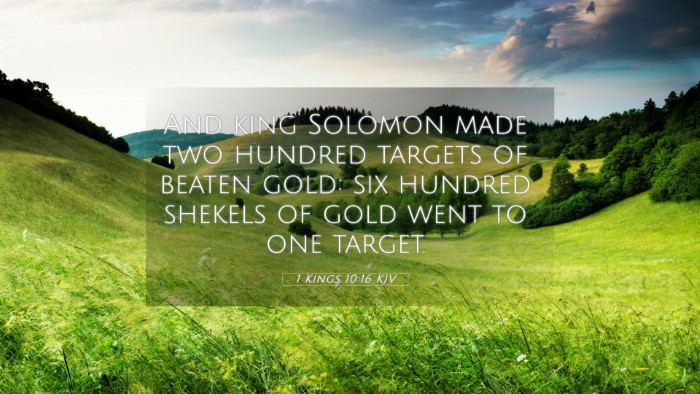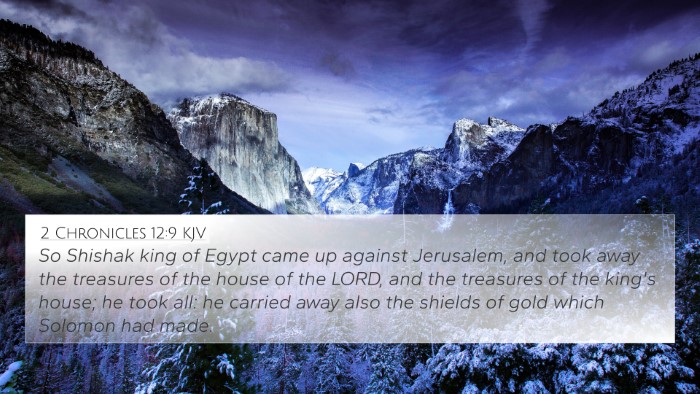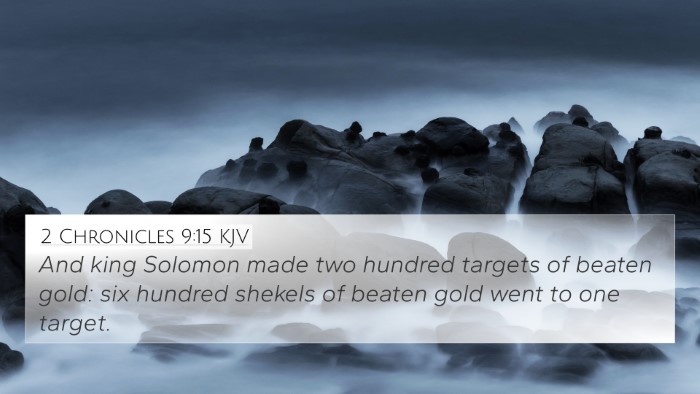Understanding 1 Kings 10:16
This verse provides a glimpse into the wealth and splendor of King Solomon's reign, specifically highlighting his acquisition of gold. Here, we explore the verse through insights from public domain commentaries and elucidate its meaning.
Verse Context and Analysis
1 Kings 10:16 states: "And king Solomon made two hundred targets of beaten gold: six hundred shekels of gold went to one target." This verse is significant in the context of Solomon’s reign, illustrating the opulence and grandeur that characterized his kingdom.
Insights from Matthew Henry
Matthew Henry emphasizes that the gold used by Solomon for the targets indicates both wealth and power. The golden shields were not mere decorations; they served as symbols of his authority and military strength. Henry suggests that the lavishness of Solomon’s kingdom was a reflection of God’s blessings upon him.
Insights from Albert Barnes
Albert Barnes expands on the significance of the targets, detailing that the immense amount of gold used (600 shekels per target) illustrates the level of prosperity in Solomon's reign. Barnes points out that these targets were used for show, thereby highlighting the peace in the kingdom—where there was no need for actual military defenses, only displays of wealth and power.
Insights from Adam Clarke
Adam Clarke further analyzes the craftsmanship involved in creating the gold targets. He notes that such luxury represents Solomon's reign where artistry and material wealth coexisted. Clarke also indicates that one should consider the spiritual implications of such wealth and how it could lead to eventual downfall should it divert focus from God.
Cross-References
1 Kings 10:16 relates to several other Biblical verses that reference wealth, splendor, and the consequences of earthly riches.
- 2 Chronicles 9:15-16: Describes the gold shields and reinforces the splendor of Solomon’s court.
- 1 Kings 10:2: Highlights the Queen of Sheba's visit and her admiration of Solomon’s wealth.
- Matthew 6:19-21: Contrasts earthly treasures with heavenly treasures, cautioning against the pursuit of wealth.
- Proverbs 11:4: States that wealth cannot save us in the day of wrath, emphasizing the transient nature of material wealth.
- Ecclesiastes 2:11: Discusses the vanity of wealth and the emptiness that can accompany it, reflecting Solomon's own later realizations.
- 1 Timothy 6:10: Warns about the love of money being a root of all evil, relevant in understanding Solomon’s trajectory.
- Psalm 62:10: Advises not to set one's heart on riches, echoing the caution against overvaluing material possessions.
Thematic Connections
The verse ties into broader Biblical themes regarding wealth and spiritual well-being. Solomon's opulence invites reflection on the balance between enjoying God’s blessings and maintaining spiritual integrity.
Bible Verse Parallels
When conducting a comparative Bible verse analysis, one can draw parallels between 1 Kings 10:16 and:
- Psalm 49:16-17: Where the psalmist reminds us that wealth cannot guarantee salvation.
- James 1:10-11: Discussing the short-lived nature of riches and the exaltation of the humble.
Conclusion
1 Kings 10:16 illustrates the majesty of Solomon's kingdom while also raising pertinent questions about the nature of wealth and its potential spiritual consequences. The reflections provided by Matthew Henry, Albert Barnes, and Adam Clarke deepen the understanding of this verse by emphasizing both its historical significance and spiritual implications.
By exploring Bible verse cross-references and thematic connections, we can gain greater insights into how this verse fits within the broader narrative of Scripture. Engaging in scriptural cross-referencing enhances our study and understanding of God’s message throughout the Bible.





